
HOW GOODSEED TOOLS CAN HELP YOU
REACH SENIORS
(Reading time: 10 minutes)
In this “How to Train” series, we describe practical ways in which believers worldwide use our tools to share the message of the gospel.
In this article, we look at how you can use GoodSeed resources to help you reach your elderly friends and family members with a clear understanding of the gospel. We’ll also look at tried and tested ways to share the good news with seniors and the elderly in nursing homes, senior communities, home-care facilities, community centres and more.
Reaching into the lives of seniors can bring unique challenges, so we want to share with you some strategies that have proven effective many times over.
We also invite you to share your own experiences with us to benefit others. You can write to us via our contact form.
THE CHALLENGE
A growing segment of our population is savouring the benefits of senior discounts!
Yet, many are missing out on the most important offer they could possibly enjoy–one with no age restrictions attached. While it is the physical health care needs of our senior population that often grab our attention, it is their spiritual health that is of far greater importance.
So, how can we take some meaningful steps to introduce these dear people to the Giver of Life–life that is not only abundant, but also eternal?
First, we need to identify some of the challenges we may have to take into account as we seek to reach out to the seniors in our lives.
Consider the following brief excerpts, taken from correspondence we have received. They touch on some of the potential challenges one may encounter as believers endeavour to be faithful witnesses for Christ to seniors in our community.
"My sister helps care for an elderly neighbour who never went to church and is over 90 years old. His mind is still sharp…"
1. Biblical illiteracy
a. An increasing number have a lifetime of having never attended any church.
b. Others may be familiar with many of the Bible’s stories but frequently don’t understand their significance in the larger context of Scripture. (For example, the reference to Jesus as the Lamb of God in John 1:29 makes no sense without understanding its Old Testament context.)
c. Still others have only a vague idea of what the Bible is all about—having heard random bits and pieces (of who God is, etc.). As a result, they find the Bible to be bewildering. Often their understanding is very confused and distorted.
"My 100-year-old father-in-law resides in a home-care facility… Many have Alzheimer’s, dementia, or are otherwise slow in their thinking."
2. Diminishing attention span
a. As one’s age progresses, the issue is usually one of fatigue. As a person tires, it is only natural that one’s mind will also slow.
b. Responding to the unique needs of any one of a broad range of dementia is another possible challenge.
As George’s health progressively failed, the time came when Aileen learned that her father-in-law didn’t have much longer to live. Though her family had prayed for his salvation for many years, George had never been open to the gospel.
3. Time constraints
Though seniors may typically have more discretionary time available to them than others, yet there may also be the realities of limited time and opportunities.
a. A reduced energy level may be a factor for some seniors.
b. Failing health may suggest that the end of life is near.
4. Resistant audience
Another challenge, not unique to seniors, may be resistance. An adverse response may be the result of any number of reasons:
a. A push back against a domineering or legalistic religious upbringing.
b. A reflection of having been “burned” by religious zealots of all stripes, eager to “sell” their message.
c. Distasteful experiences with well-meaning but insensitive believers.
EXPERIENCES OF
SOME WHO'VE DONE IT
These vignettes reflect the experiences of those who have used GoodSeed resources to share the gospel with the elderly.
Reaching the biblically illiterate
“I love The Story that Matters…the simple English laid out in this story is the tool that the Spirit of God used to allow a 90 year-old neighbour to understand the gospel.
He made a decision to follow Christ today!”
"My sister helps care for an elderly neighbour who never went to church and is over 90 years old. His mind is still sharp…"
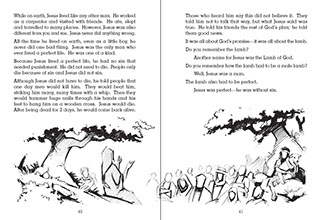
Reaching those with diminishing attention spans
"My 100-year-old father-in-law resides in a home-care facility… Many have Alzheimer’s, dementia, or are otherwise slow in their thinking."

“Recently, my wife Margaret began reading the children’s picture book, The Lamb, to her 100-year-old father and five other residents after lunch. They could hardly wait for each session. It was excellent!
During the first session, Margaret read about how God created the world out of nothing and that all He did was speak. One of the residents, Mr. Lewis, shouted out, ’Well, I’ll be…!’”
Reaching those with time constraints
As George’s health progressively failed, the time came when Aileen learned that her father-in-law didn’t have much longer to live. Though her family had prayed for his salvation for many years, George had never been open to the gospel.
Aileen prayerfully decided to take a copy of The Lamb with her as she went to visit her father-in-law.
Day after day, as Aileen sat at George’s bedside, she read the book aloud. He listened intently and gazed at the colourful pictures through rheumy eyes. Carefully he pondered the questions at the end of each chapter and answered them quietly but clearly.
By the end, Aileen watched as George softened to the message of hope offered in this simple book, and she was certain he believed.

Reaching those at a distance
89-year-old Martha just completed a long-distance study of The Stranger on the Road to Emmaus with a friend.
After each had read a chapter separately, they would get on the phone together and go through the chapter again with the friend—who had better eyesight—reading the text. In the course of doing so, they would discuss it as a way of reviewing the material.
The experience was so profitable that Martha ordered more books!

PLANNING YOUR OUTREACH
Here is some general advice on reaching seniors.
1. One on one
Engaging with just one senior at a time is preferable. Each person is unique and will respond differently as you share the message. Being alone with them allows privacy, allows them to ask questions and fosters an environment where you can give them undivided attention.
2. Reading to a group
Reading to a group works if this is treated as a group activity time. Ensure that every group is small and everyone close enough to hear you and see the book illustrations. You have to gauge how well the group is comprehending as a whole and work to ensure that all are tracking along in the story.
3. Read aloud to them
It works best if you read aloud the material to them. Read dynamically and clearly and at a steady pace. If using one of the illustrated books, take time to show the illustrations and point out important aspects of the pictures.
4. Ask questions to check for comprehension
Questions are not meant to quiz them or put them on the spot. Rather, you are checking for understanding. Gently probe for understanding with your own objective questions. For example:
• “What was the one rule God gave Adam and Eve to obey?” or
• “What kind of sacrifice did God ask people to bring to the altar?”
If they are able to answer, you can move on with the story. Otherwise, read back the relevant paragraphs and explain again.
5. Choose a time of the day when the senior is most alert.
All of us have our periods of the day when we learn best. Check to see which part of the day the senior is more alert or has the longest attention span. Try to get together during those times.
6. Go as fast as you can, but as slow as you must.
The suggested resources in the next section tell the gospel message as a historical narrative. So while we recognize that each session should not run too long, try to keep the successive sessions close together in order that the senior not lose the thread of the story and can see the whole span of the biblical narrative.
OTHER PRACTICAL ADVICE
7. Familiarize yourself
Be sure to familiarize yourself first with the content of the resource(s) you are planning on using or giving away. This will help prepare you for any questions that may arise.
8. Learning style
Keep in mind the way seniors learned when they were young.
9. Short sessions
Keep each session short (40 minutes is probably ideal) and review often.
(The companion workbooks may not be feasible to use for review with this age group.)
10. Total length of study
Don’t drag out the total length of the study too long. In order to understand the relationship of each part of the story with the other and their meaning, it is important for the message of the Bible to be understood as one continuous narrative.
11. Don't assume
Take time to ask questions to check understanding. Don’t assume. Be careful to avoid information overload.
RESOURCES YOU CAN USE
The Lamb
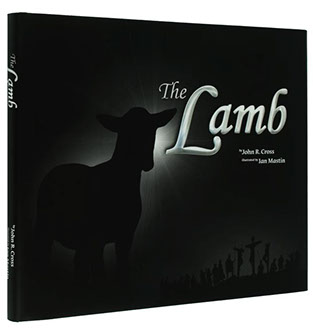
Time Requirement:
It takes two hours on average to read right through the book. However, depending on the senior, you may want to read one chapter at a time and do this over consecutive days.
Read:
Though written for children, many have found that the structure and pace of this book is effective in communicating to the elderly. Read the book aloud, showing the full-colour illustrations to help you explain the gospel message. This book has been very helpful in situations where attention spans are short or where time is limited.
Ensure Understanding:
Use the questions at the end of each chapter to check for understanding. Be wise in how you work through the questions. You do not want to appear condescending or challenging. The aim is to check for understanding.
Retell:
At the end of the book, summarize what you have read. Allow the senior to assist in summarizing the story.
Ask the questions:
Ask the questions found at the end of the book to determine what they believe. In some instances, you may need to go through the book a second time before clear understanding is achieved. We have received correspondence from adult children saying that they’ve had to read the story more than once before their aged parent grasped the meaning of the gospel message.
Use the CD:
If appropriate, you can use the CD to reinforce the story. Even when you are not present, the senior can play it and listen to the story again.
Read a Testimony: The Lamb for my father-in-law
The Story that Matters

Time Requirement:
If time is even more limited, or you have only one opportunity to share the gospel message, this booklet may help. It is only 64 pages long and can be read aloud in less than an hour.
Read:
As with The Lamb, read aloud the gospel story, showing the illustrations as you go along. Pause to ask questions to ensure that the listener is following along.
Ask the questions:
At the back of the booklet are two sets of questions. The first set checks for understanding while the second set checks to see what your listener believes.
Read a Testimony: Over 90 and trusting Christ for the first time
The Stranger on the Road to Emmaus
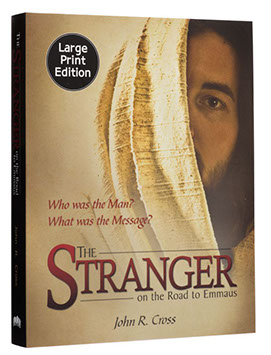
Time Requirement:
It takes about 11 hours to read through this book. Use this if you know you have enough time to finish the whole book. It’s best if you can complete it in less than a month. Stretching it beyond that time may result in a fractured understanding of the gospel story. One way to mitigate this is to begin with a shorter book like The Story that Matters to give an overview of the gospel first.
Read:
There is a large print edition of The Stranger available. If the senior would like to take turns reading with you, the large print is a good option. One way to do it is you read the commentary while the senior reads the Bible verses. Alternatively, you can do all the reading.
Ask the questions:
Ask questions after each section to check for understanding. If you wish, you can draw questions from the related workbook. We generally don’t recommend doing the workbook as a formal exercise for seniors as it may be too much work for some. However, as each person is different, use your discretion on whether it will be helpful in your situation.
Respond to any questions he or she may have, but defer those that do not pertain to what was just covered. You do not want to get derailed as you go through the book. Because later chapters in the book build on the foundations of the earlier ones, many questions will naturally get answered along the way.
At the end of the book:
Chapter 15 is important as it asks the reader what he or she now believes about the Bible. Go through this chapter slowly and carefully. If there are still questions, now is the time to respond to them.
Alternatives to The Stranger:
By This Name and All that the Prophets have Spoken are alternatives to The Stranger. They address questions from different worldviews. Learn more about the differences.
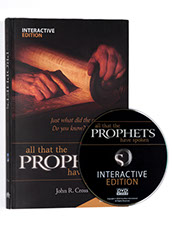

For those influenced by Islam, but not necessarily Muslim by belief.
For those influenced by polytheism, pantheism, atheism, agnosticism and animism. Also includes those with postmodern, post-Christian, secular ideas.
The Stranger Videobook
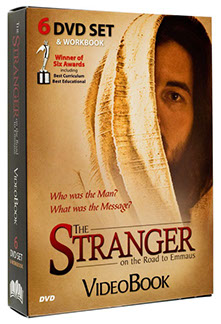
Time Requirement:
This is an 11-hour video series. The six DVDs are divided into a total of 52 sections, ranging between 4-27 minutes each. In any given session you can watch as many or as few sections as you like.
Watch Together:
You can watch the videos together with the senior or group of seniors and then discuss what was being taught. This is a stress-free way for anyone to share the message of the gospel.
Read a Testimony: 27 groups and counting
Learn more about The Stranger Videobook
OTHER WAYS TO REACH SENIORS
1. Group Study
If you volunteer at a seniors’ home, nursing home or community centre that has programs for seniors, consider running a course about the Bible. You can use the Worldview Rethink curriculum for this. The length of the sessions will depend on the attention span of the class. Make full use of the visual aids and the workbook to maximize comprehension.
2. Donate
• Donate copies of the large print edition of The Stranger to the libraries of senior homes or other community libraries.
• Donate audiobooks to the libraries.
3. Send a personal message and a book
Read this creative way that one gentleman reached out to his group of senior friends.
Read a Testimony: Before we slip into eternity
Seniors and the elderly are a spectrum of people with a wide range of learning styles, attention spans and learning challenges. While we have presented some tried and tested methods to share the good news with them, assess your audience.
And remember to pray. Our task is to share the good news. It is the Lord who works in the hearts.
I WANT TO LEARN
ABOUT GOODSEED
The Monthly
GoodSeed eNewsletter
Sign up to receive articles, testimonies, sneak peeks of new resources & upcoming seminars. You'll receive a PDF copy of The Tabernacle: Model of Messiah as a thank you for partnering with us.
© 2023 GoodSeed International. All rights reserved.


